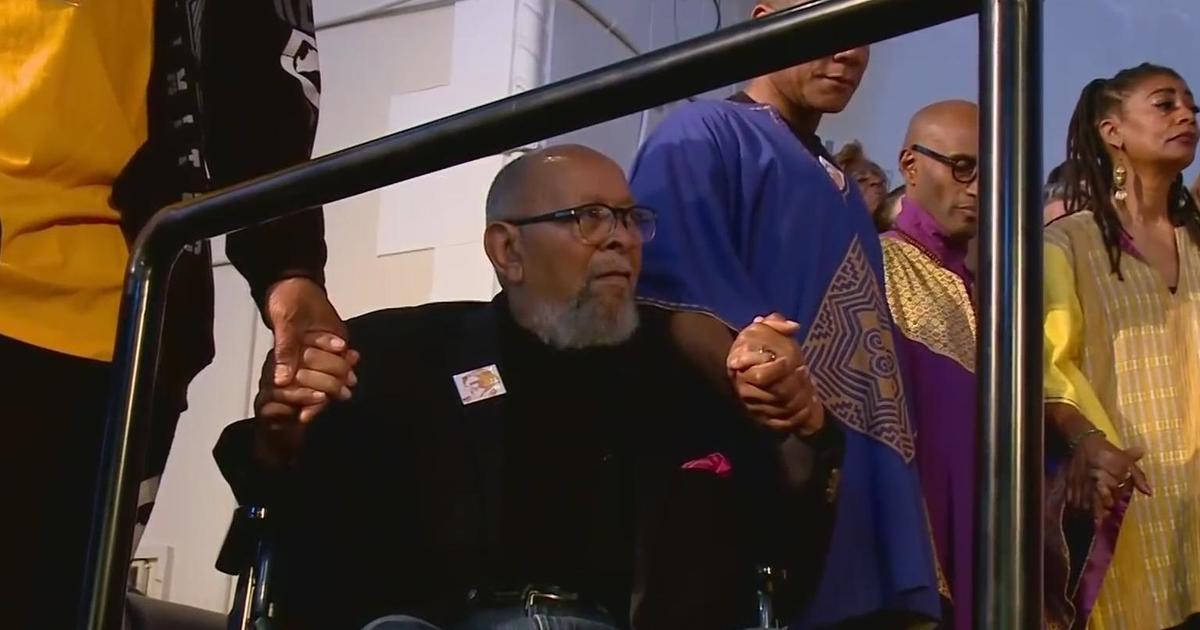Maya Angelou, Poet And Author Who Got Her Start In Bay Area, Dies At 86
WINSTON-SALEM, N.C. (CBS SF) — Author and poet Maya Angelou, who spent her formative years in the San Francisco Bay Area becoming a force on stage, screen and the printed page, has died. She was 86.
Wake Forest University announced Angelou's death in a news release Wednesday.
She had been scheduled to attend the 2014 MLB Beacon Awards Luncheon on May 30 but pulled out for "health reasons," Major League Baseball said last week. Last month, she also canceled an event in Fayetteville, Ark., because she was recovering from an "unexpected ailment" that sent her to the hospital.
She gained acclaim for her first book, her autobiography "I Know Why the Caged Bird Sings," making her one of the first African-American women to write a best-seller.
In her earlier years she was a ground-breaker in the Bay Area.
In 1940, Angelou's separated parents moved her from the south to Oakland where she lived with her mother, grandmother and brother Bailey. Within months her mother remarried and the family moved to San Francisco's Fillmore District, according to the 'Just the Facts' biography of her life.
Angelou dropped out of high school to became the first African-American female street car conductor in San Francisco at age 16. "I loved the uniforms," Angelou told longtime friend and protégé Oprah Winfrey during and appearance on her show. "I said, 'That's a job I want.'" She told Oprah that she was more fearful of disappointing her mother than changing the culture of the transit agency.
When she later began her career as a nightclub singer at The Purple Onion in San Francisco's North Beach, she changed her birth name - Marguerite Johnson - to the professional name Maya Angelou, combining a childhood nickname from her brother with a form of her current husband's name. At the Purple Onion she shared billing with another future star, Phyllis Diller. Her appearances at the club – which closed in 2012 – built her fame to the point where she was able to go on tour with a production of the opera Porgy and Bess, according to her Academy of Achievement biography. She would then go on to work in music, television, film and literature.
Angelou was scheduled to headline Glide Memorial Church's holiday festival in 2013, but couldn't make it due to illness. Instead, she sent in avideo.
Angelou was little known outside the theatrical community until "I Know Why the Caged Bird Sings," which might not have happened if James Baldwin hadn't persuaded Angelou, still grieving over Martin Luther King's death, to attend a party at Jules Feiffer's house. Feiffer was so taken by Angelou that he mentioned her to Random House editor Bob Loomis, who persuaded her to write a book by daring her into it, saying that it was "nearly impossible to write autobiography as literature."
"Well, maybe I will try it," Angelou responded. "I don't know how it will turn out. But I can try."
Angelou's musical style was clear in a passage about boxing great Joe Louis's defeat in 1936 against German fighter Max Schmeling:
"My race groaned," she wrote. "It was our people falling. It was another lynching, yet another Black man hanging on a tree. One more woman ambushed and raped. A Black boy whipped and maimed. It was hounds on the trail of a man running through slimy swamps. ... If Joe lost we were back in slavery and beyond help."
Angelou's memoir was occasionally attacked, for seemingly opposite reasons. In a 1999 essay in Harper's, author Francine Prose criticized "Caged Bird" as "manipulative" melodrama. Meanwhile, Angelou's passages about her rape and teen pregnancy have made it a perennial on the American Library Association's list of works that draw complaints from parents and educators.
"`I thought that it was a mild book. There's no profanity," Angelou told the AP. "It speaks about surviving, and it really doesn't make ogres of many people. I was shocked to find there were people who really wanted it banned, and I still believe people who are against the book have never read the book."
Angelou appeared on several TV programs, notably the groundbreaking 1977 miniseries "Roots." She was nominated for a Tony Award in 1973 for her appearance in the play "Look Away." She directed the film "Down in the Delta," about a drug-wrecked woman who returns to the home of her ancestors in the Mississippi Delta. She won three Grammys for her spoken-word albums and in 2013 received an honorary National Book Award for her contributions to the literary community.
Back in the 1960s, Malcolm X had written to Angelou and praised her for her ability to communicate so directly, with her "feet firmly rooted on the ground." In 2002, Angelou communicated in an unexpected way when she launched a line of greeting cards with industry giant Hallmark. Angelou admitted she was cool to the idea at first. Then she went to Loomis, her editor at Random House.
"I said, `I'm thinking about doing something with Hallmark,"' she recalled. "And he said, `You're the people's poet. You don't want to trivialize yourself.' So I said `OK' and I hung up. And then I thought about it. And I thought, if I'm the people's poet, then I ought to be in the people's hands -- and I hope in their hearts. So I thought, `Hmm, I'll do it."'
In North Carolina, she lived in an 18-room house and taught American Studies at Wake Forest University. She was also a member of the Board of Trustees for Bennett College, a private school for black women in Greensboro, N.C. Angelou hosted a weekly satellite radio show for XM's "Oprah & Friends" channel.
She remained close enough to the Clintons that in 2008 she supported Hillary Rodham Clinton's candidacy over the ultimately successful run of the country's first black president, Barack Obama. But a few days before Obama's inauguration, she was clearly overjoyed. She told the Arkansas Democrat-Gazette she would be watching it on television "somewhere between crying and praying and being grateful and laughing when I see faces I know."
Active on the lecture circuit, she gave commencement speeches and addressed academic and corporate events across the country. Angelou received dozens of honorary degrees, and several elementary schools were named for her. As she approached her 80th birthday, she decided to study at the Missouri-based Unity Church, which advocates healing through prayer.
"I was in Miami and my son (Guy Johnson, her only child) was having his 10th operation on his spine. I felt really done in by the work I was doing, people who had expected things of me," said Angelou, who then recalled a Unity church service she attended in Miami.
"The preacher came out -- a young black man, mostly a white church -- and he came out and said, `I have only one question to ask, and that is, "Why have you decided to limit God?"' And I thought, `That's exactly what I've been doing.' So then he asked me to speak, and I got up and said, `Thank you, thank you, thank you, thank you, thank you, thank you.' And I said it about 50 times, until the audience began saying it with me, `Thank you, THANK YOU!"'
TM and © Copyright 2014 CBS Radio Inc. and its relevant subsidiaries. CBS RADIO and EYE Logo TM and Copyright 2014 CBS Broadcasting Inc. Used under license. All Rights Reserved. This material may not be published, broadcast, rewritten, or redistributed. The Associated Press contributed to this report.



